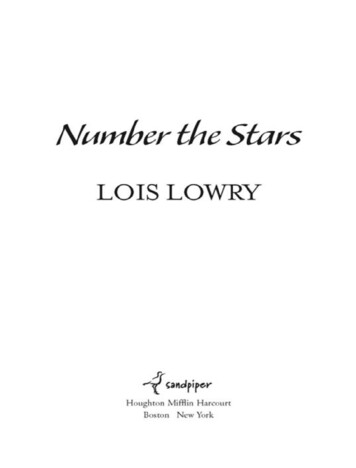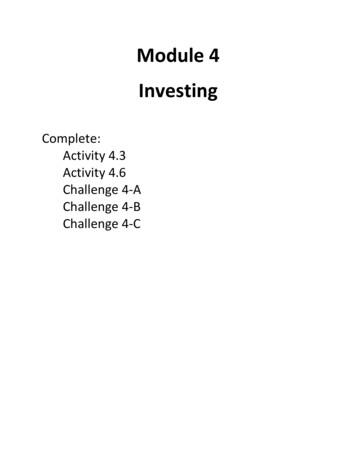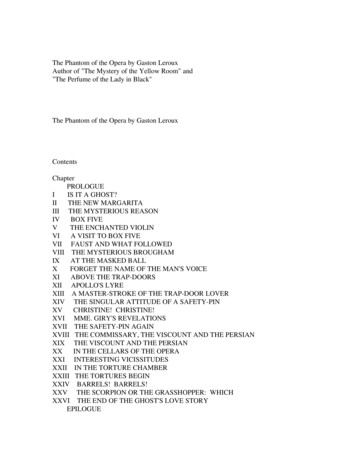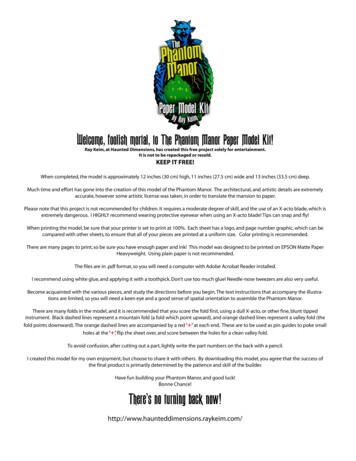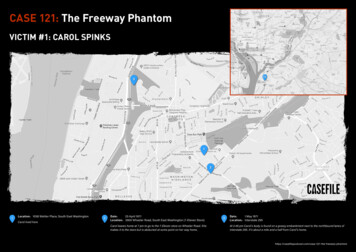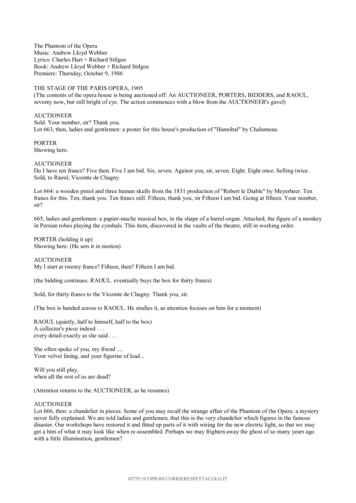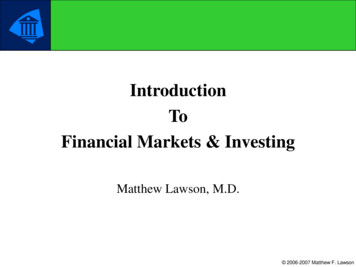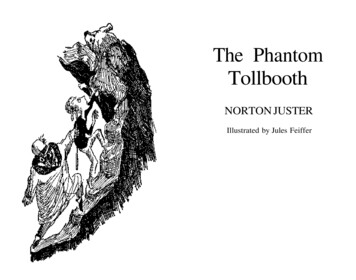
Transcription
The PhantomTollboothNORTON JUSTERIllustrated by Jules Feiffer
CONTENTSTo Andy and Kenny,who waited so patiently.Windward Books are published by Random House, Inc. First Windward Silverback Edition, October 1972. Originally published by Epstein & Carroll Associates, Inc., in 1961 and subsequently publishedby Random House, Inc., in 1964.Text Copyright 1961 by Norton JusterIllustrations Copyright 1961 by Jules FeifferAll rights reserved under International and Pan-American CopyrightConventions. Published in the United States by Random House, Inc.,New York, and in Canada by Random House of Canada Limited,Toronto.ISBN: 0-394-82199-8Library of Congress Catalog Card Number: 61-13202Manufactured in the United States of 8.19.20.MiloBeyond ExpectationsWelcome to DictionopolisConfusion in the Market PlaceShort ShriftFaintly Macabre's StoryThe Royal BanquetThe Humbug VolunteersIt's All in How You Look at ThingsA Colorful SymphonyDischord and DynneThe Silent ValleyUnfortunate ConclusionsThe Dodecahedron Leads the WayThis Way to InfinityA Very Dirty BirdUnwelcoming CommitteeCastle in the AirThe Return of Rhyme and ReasonGood-bye and 237253
1. MiloThere was once a boy named Milo who didn't knowwhat to do with himself—not just sometimes, but always.When he was in school he longed to be out, and whenhe was out he longed to be in. On the way he thoughtabout coming home, and coming home he thought aboutgoing. Wherever he was he wished he were somewhereelse, and when he got there he wondered why he'd bothered. Nothing really interested him—least of all thethings that should have."It seems to me that almost everything is a waste oftime," he remarked one day as he walked dejectedlyhome from school. "I can't see the point in learning tosolve useless problems, or subtracting turnips from turnips, or knowing where Ethiopia is or how to spell February." And, since no one bothered to explain otherwise,he regarded the process of seeking knowledge as thegreatest waste of time of all.
As he and his unhappy thoughts hurried along (forwhile he was never anxious to be where he was going,he liked to get there as quickly as possible) it seemed agreat wonder that the world, which was so large, couldsometimes feel so small and empty."And worst of all," he continued sadly, "there's nothing for me to do, nowhere I'd care to go, and hardly anything worth seeing." He punctuated this last thoughtwith such a deep sigh that a house sparrow singingnearby stopped and rushed home to be with his family.Without stopping or looking up, he rushed past thebuildings and busy shops that lined the street and in afew minutes reached home—dashed through the lobby—hopped onto the elevator—two, three, four, five, six,seven, eight, and off again—opened the apartment door—rushed into his room—flopped dejectedly into a chair,and grumbled softly, "Another long afternoon."He looked glumly at all the things he owned. Thebooks that were too much trouble to read, the tools he'dnever learned to use, the small electric automobile hehadn't driven in months—or was it years?—and the hundreds of other games and toys, and bats and balls, andbits and pieces scattered around him. And then, to oneside of the room, just next to the phonograph, he noticedsomething he had certainly never seen before.Who could possibly have left such an enormous package and such a strange one? For, while it was not quitesquare, it was definitely not round, and for its size it waslarger than almost any other big package of smallerdimension that he'd ever seen.
Attached to one side was a bright-blue envelopewhich said simply: "FOR MILO, WHO HAS PLENTYOF TIME."Of course, if you've ever gotten a surprise package,you can imagine how puzzled and excited Milo was; andif you've never gotten one, pay close attention, becausesomeday you might."I don't think it's my birthday," he puzzled, "andChristmas must be months away, and I haven't been outstandingly good, or even good at all." (He had to admitthis even to himself.) "Most probably I won't like it anyway, but since I don't know where it came from, I can'tpossibly send it back." He thought about it for quite awhile and then opened the envelope, but just to be polite."ONE GENUINE TURNPIKE TOLLBOOTH," itstated—and then it went on:"EASILY ASSEMBLED AT HOME, AND FOR USEBY THOSE WHO HAVE NEVER TRAVELED INLANDS BEYOND.""Beyond what?" thought Milo as he continued to read."THIS PACKAGE CONTAINS THE FOLLOWINGITEMS:"One (1) genuine turnpike tollbooth to be erectedaccording to directions."Three (3) precautionary signs to be used in a precautionary fashion."Assorted coins for use in paying tolls."One (1) map, up to date and carefully drawn by mas-ter cartographers, depicting natural and man-madefeatures."One (1) book of rules and traffic regulations, whichmay not be bent or broken."And in smaller letters at the bottom it concluded:"Results are not guaranteed, but if not perfectly satisfied, your wasted time will be refunded."Following the instructions, which told him to cut here,lift there, and fold back all around, he soon had the toll-
booth unpacked and set up on its stand. He fitted thewindows in place and attached the roof, which extendedout on both sides and fastened on the coin box. It wasvery much like the tollbooths he'd seen many times onfamily trips, except of course it was much smaller andpurple."What a strange present," he thought to himself. "Theleast they could have done was to send a highway withit, for it's terribly impractical without one." But since, atthe time, there was nothing else he wanted to play with,he set up the three signs,SLOW DOWN APPROACHING TOLLBOOTHPLEASE HAVE YOUR FARE READYHAVE YOUR DESTINATION IN MINDand slowly unfolded the map.As the announcement stated, it was a beautiful map,in many colors, showing principal roads, rivers and seas,towns and cities, mountains and valleys, intersectionsand detours, and sites of outstanding interest bothbeautiful and historic.The only trouble was that Milo had never heard ofany of the places it indicated, and even the namessounded most peculiar."I don't think there really is such a country," he concluded after studying it carefully. "Well, it doesn't matter anyway." And he closed his eyes and poked a fingerat the map."Dictionopolis," read Milo slowly when he saw whathis finger had chosen. "Oh, well, I might as well go thereas anywhere."He walked across the room and dusted the car off carefully. Then, taking the map and rule book with him, hehopped in and, for lack of anything better to do, droveslowly up to the tollbooth. As he deposited his coin androlled past he remarked wistfully, "I do hope this is aninteresting game, otherwise the afternoon will be so terribly dull."
2. Beyond ExpectationsSuddenly he found himself speeding along an unfamiliar country highway, and as he looked back over hisshoulder neither the tollbooth nor his room nor even thehouse was anywhere in sight. What had started as makebelieve was now very real."What a strange thing to have happen," he thought(just as you must be thinking right now). "This game ismuch more serious than I thought, for here I am ridingon a road I've never seen, going to a place I've neverheard of, and all because of a tollbooth which came fromnowhere. I'm certainly glad that it's a nice day for a trip,"he concluded hopefully, for, at the moment, this was theone thing he definitely knew.The sun sparkled, the sky was clear, and all the colorshe saw seemed to be richer and brighter than he couldever remember. The flowers shone as if they'd beencleaned and polished, and the tall trees that lined theroad shimmered in silvery green."WELCOME TO EXPECTATIONS," said a carefullylettered sign on a small house at the side of the road."INFORMATION, PREDICTIONS, AND ADVICECHEERFULLY OFFERED. PARK HERE ANDBLOW HORN."With the first sound from the horn a little man in along coat came rushing from the house, speaking as fastas he could and repeating everything several times:
"My, my, my, my, my, welcome, welcome, welcome,welcome to the land of Expectations, to the land of Expectations, to the land of Expectations. We don't getmany travelers these days; we certainly don't get manytravelers these days. Now what can I do for you? I'm theWhether Man."Is this the right road for Dictionopolis?" asked Milo,a little bowled over by the effusive greeting."Well now, well now, well now," he began again, "Idon't know of any wrong road to Dictionopolis, so if thisroad goes to Dictionopolis at all it must be the right road,and if it doesn't it must be the right road to somewhereelse, because there are no wrong roads to anywhere. Doyou think it will rain?""I thought you were the Weather Man," said Milo,very confused."Oh no," said the little man, "I'm the Whether Man,not the Weather Man, for after all it's more importantto know whether there will be weather than what theweather will be." And with that he released a dozen balloons that sailed off into the sky. "Must see which waythe wind is blowing," he said, chuckling over his littlejoke and watching them disappear in all directions."What kind of a place is Expectations?" inquired Milo,unable to see the humor and feeling very doubtful of thelittle man's sanity."Good question, good question," he exclaimed. "Expectations is the place you must always go to before youget to where you're going. Of course, some people nevergo beyond Expectations, but my job is to hurry themalong whether they like it or not. Now what else can Ido for you?" And before Milo could reply he rushed intothe house and reappeared a moment later with a newcoat and an umbrella."I think I can find my own way," said Milo, not at allsure that he could. But, since he didn't understand thelittle man at all, he decided that he might as well moveon—at least until he met someone whose sentencesdidn't always sound as if they would make as much sensebackwards as forwards."Splendid, splendid, splendid," exclaimed theWhether Man. "Whether or not you find your own way,
you're bound to find some way. If you happen to findmy way, please return it, as it was lost years ago. I imagine by now it's quite rusty. You did say it was goingto rain, didn't you?" And with that he opened the umbrella and walked with Milo to the car."I'm glad you made your own decision. I do so hateto make up my mind about anything, whether its goodor bad, up or down, in or out, rain or shine. Expect everything, I always say, and the unexpected never happens.Now please drive carefully; good-by, good-by, good-by,good . . ." His last good-by was drowned out byan enormous clap of thunder, and as Milo drove downthe road in the bright sunshine he could see the WhetherMan standing in the middle of a fierce cloudburst thatseemed to be raining only on him.The road dipped now into a broad green valley andstretched toward the horizon. The little car bouncedalong with very little effort, and Milo had hardly to touchthe accelerator to go as fast as he wanted. He was gladto be on his way again."It's all very well to spend time in Expectations," hethought, "but talking to that strange man all day wouldcertainly get me nowhere. He's the most peculiar personI've ever met," continued Milo—unaware of how manypeculiar people he would shortly encounter.As he drove along the peaceful highway he soon fellto daydreaming and paid less and less attention towhere he was going. In a short time he wasn't payingany attention at all, and that is why, at a fork in the road,when a sign pointed to the left, Milo went to the right,
along a route which looked suspiciously like the wrongway.Things began to change as soon as he left the mainhighway. The sky became quite gray and, along with it,the whole countryside seemed to lose its color and assume the same monotonous tone. Everything was quiet,and even the air hung heavily. The birds sang only graysongs and the road wound back and forth in an endlessseries of climbing curves.Mile aftermile aftermile aftermile he drove, and now, gradually the car went slowerand slower, until it was hardly moving at all."It looks as though I'm getting nowhere," yawnedMilo, becoming very drowsy and dull. "I hope I haven'ttaken a wrong turn."Mile aftermile aftermile aftermile, and everything became grayer and more monotonous. Finally the car just stopped altogether, and,hard as he tried, it wouldn't budge another inch."I wonder where I am," said Milo in a very worriedtone."You're . . . in . . . the . . . Dol . . . drums,"wailed a voice that sounded far away.He looked around quickly to see who had spoken.No one was there, and it was as quiet and still as onecould imagine."Yes . . . the . . . Dol . . . drums," yawned another voice, but still he saw no one."WHAT ARE THE DOLDRUMS?" he cried loudly,and tried very hard to see who would answer this time."The Doldrums, my young friend, are where nothingever happens and nothing ever changes."This time the voice came from so close that Milojumped with surprise, for, sitting on his right shoulder,
so lightly that he hardly noticed, was a small creatureexactly the color of his shirt."Allow me to introduce all of us," the creature wenton. "We are the Lethargarians, at your service."Milo looked around and, for the first time, noticeddozens of them—sitting on the car, standing in the road,and lying all over the trees and bushes. They were verydifficult to see, because whatever they happened to besitting on or near was exactly the color they happenedto be. Each one looked very much like the other (exceptfor the color, of course) and some looked even morelike each other than they did like themselves."I'm very pleased to meet you," said Milo, not surewhether or not he was pleased at all. "I think I'm lost.Can you help me please?""Don't say 'think,' " said one sitting on his shoe, forthe one on his shoulder had fallen asleep. "It's againstthe law." And he yawned a
1. Milo There was once a boy named Milo who didn't know what to do with himself—not just sometimes, but always. When he was in school he longed to be out, and when
